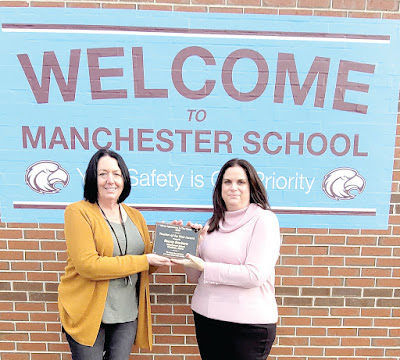Stacey Sanborn, a fourth-grade teacher at Manchester School in Windham, has had a lifelong passion for gardening especially as it alleviates food insecurity. She’s passed that love on to her students and for her innovative and creative approach, Sanborn has been awarded the Maine Agriculture In The Classroom Teacher of the Year (MAITC) Award for 2022.
The MAITC organization singled out Sanborn as a teacher who incorporates agricultural education in the classroom while at the same time, aligning that subject with core curriculum standards in science, math, social studies, and art. But perhaps just as importantly, Sanborn also introduces the importance of food insecurity and how it affects others’ lives.
This is not the first award Sanborn has received in terms of agriculture and how it can help others who are less fortunate.
“It was while I was in high school and a direct result of my work with a project, the 4-H Hunger Garden that I started, is where my interest in food insecurity began,” Sanborn said.
Her project was recognized for its contribution to the community, and she won her first award, the “America’s Future Award” presented by WCSH Channel 6. She said that this experience made a big impact upon her and became a driving force in her adult life and as a teacher.
“I continue to believe that everyone should have access to fresh fruits and vegetables. This belief has stayed with me during my years teaching at Manchester School and co-coordinating the school gardens,” she said.
The agriculture program has shifted and changed throughout the 18 years since Sanborn began teaching at Manchester School.
“Flower gardening is where I started initially,” she said. “The students and I would make arrangements and deliver them to new staff members. I began to see the educational benefits and realized there was more opportunity for me and the students if we expanded the program.”
In addition to the 12 raised beds for vegetable gardens and a hoop house with three raised beds, today the Manchester School campus is also host to six apple trees, three pear trees, and two varieties of grapevines.
Sanborn said incorporating gardening as part of the curriculum is important because Maine is a farming and aquaculture state, and students get to experience how much we are all a part of something bigger and how life is interrelated.
“Teaching students about agriculture helps them to develop the understanding of where our food comes from,” she said. “Students can see the importance of protecting a long Maine tradition of farming. It gets them out of the classroom and into the outdoors where the students are motivated learners with plenty of opportunity for fun and hands-on experiences.”
Her students are involved in all parts of the gardening process – from seed to harvest – and as they do so, they learn the traditional “reading, writing, and arithmetic.” Ways in which the conventional curriculum is a part of the gardening program include activities such as composting and soil experiments, pollination, keeping detailed records, data collection, and analysis to name just a few. Sanborn also points out that the social studies curriculum plays a strong role in Manchester School’s agriculture program.
“Gardening offers the guiding principles of being part of a community and being an active problem solver,” she said. “Doing something for others – even if it is something small – can have a big impact.”
Some of what the students grow, they get to sample, making some of their favorite recipes such as carrot muffins and “Amazing Carrot Soup.” What they can’t use in the cafeteria, they give to the RSU 14 nutrition program and the Windham Food Pantry. But the social responsibility the students learn in Sanborn’s class doesn’t end there.
“A former student-gardener who lived with food insecurity started their own garden at home and were so successful they were able to share produce with other families in need,” Sanborn said.
It appears the lessons learned have continued to make an impact on two former Sanborn students, who are now in the fifth grade.
Jaxon Dorr said that he enjoyed learning about gardening outside and not having to be in the classroom all day.
“My favorite part about Ms. Sanborn’s class is learning how to plant crops,” he said.
Jakobi Hougaz-McCormick agreed with Dorr saying “I really liked trying to guess the temperature of the hoop house, but I really enjoyed giving food to the school and others who needed it.”
Sanborn says she feels very honored to be a part of this program and is grateful for the recognition from MAITC, however, she believes this is not her award alone.
“I must recognize a former colleague, Master gardener, and a great mentor Pam Lenz,” Sanborn said. “She has put so much effort into this program and is a major part of its success. Pam has helped me to achieve everything I’ve done, and it is a true partnership. She was instrumental in keeping the program going during the early days of the pandemic when schools were not meeting in person. She continued by starting seedlings, planting them in the garden, and creating gardening videos that were used as part of the remote learning experience. Pam is just as an important part of this award and I couldn’t have done it without her.”
Sanborn received her undergraduate from the University of New Hampshire and obtained a master’s degree in education from the University of Southern Maine. She has been a teacher for a total of 23 years.
She lives in Standish with her husband, David, and has two adult sons, Nicholas and Colby, and is part of a large extended family. When she is not busy teaching and gardening, Sanborn can be found exploring Maine lighthouses and lakes, camping, and trying out her new hobby, golfing. <


